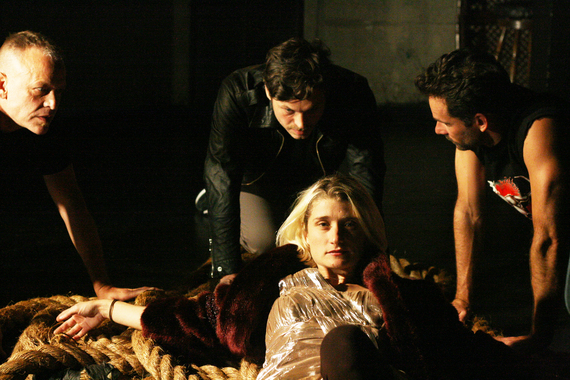I will never forgot the day OBIE and Bessie Award-winning choreographer Mark Dendy (pictured at far left with Stephen Donovan, Matthew Hardy and Heather Christian) taught me how to lift a chair.
We were rehearsing his dance-play Dream Analysis, set to debut at the Joyce in 1998. I was an actor in the show (before becoming a novelist, I spent some time on the boards), and my character needed to move a wooden chair upstage. I learned, from Dendy, that any movement can be magical. I did not simply lift a chair; I made it part of my body, part of a fluid, poetic motion.
Flash-forward 15 years. I was intrigued when I recently read about Dendy's new dance-play, Labyrinth, opening in October at Abrons Arts Center -- in particular, how it compared and contrasted to his earlier piece. Reading about it took me back to the brief time I spent with him, and I was eager to find out how his life and career had evolved.
I caught up with him after a rehearsal in New York, to chat about the past and his future.
Scott Alexander Hess: How does Labyrinth compare/contrast/relate to your dance-play Dream Analysis in terms of theme, production, and presentation?
Mark Dendy: Like Dream Analysis. there are a lot of balls in the air. Multiple story lines. Both pieces are autobiographical. Dream Analysis was 15 years ago, so it was much more about the lead character Eric's personal journey, his coming of age and self-acceptance and coming to terms with his sexuality.
With Labyrinth I'm still taking a personal approach, but with much larger themes, starting with a huge archetype, Theseus from Athens, Georgia, who goes on a hero quest to conquer his demons. Where Dream Analysis was focused on the mother, Labyrinth is focused on the father and that side of the family.
The rest of the archetypes are big ones: the monster, the sociopathic daddy (played by me). Ariadne is played by me as a transgender drug-addict sex worker, as are the grandmother Hannah, a minister's wife with a secret. And this time I play the protagonist as well, front man for Theseus.
Stephen Donovan plays the shadow, and Heather Christian, who is composing and performing original music, plays the still, small voice who transforms at the end of the piece.
This show touches on our culture of fear, hate and intolerance, especially exploring the vitriolic, virulent hatred of President Obama that seems to stop at nothing. Princess Ariadne also delivers a blistering critique on Mayor Bloomberg's legacy of displacement over development and gentrification that seems to be sucking the New York right out of New York.
SAH: How was the collaborative process, and how does it alter the work from what you may have first imagined when creating it?
MD: There is a lot more text in this piece. The times we live in call for it, so when there is so much on the page jumping off into action and dance, everything changes. For instance, a mud fight that I had imagined just can't happen in the underground theater at Abrons five nights a week. But we also find wonderful new things when we get it on its feet.
I've been working on this piece for three years in different residencies across the country and here in the city. And there are people who have worked on it along the way who, for one reason or another, are not in the final production.
I'm really excited about the original music of Heather Christian.
SAH: You did some work on Broadway (Taboo), then got back to your downtown roots. What can you tell us about that decision? Can you shed light on that evolution for you, for young choreographers out there?
MD: Well, first off, I've realized how much that work uptown on Broadway, off-Broadway, opera and in regional theater has prepared me to make this work. The eight-show week was all new to me. In many ways for me, it didn't lend itself to a productive creative process. You'd freeze a show, and there was so much left you wanted to do but no time. I loved many things about it, but there's an old Southern saying, "If you go chasin' after two dogs, you're liable not to catch either one of them," and I really yearned for my creative autonomy back, making work with a small group who I alone choose. But I wouldn't trade anything for the experience. But I'm hoping the next time I'm uptown, it's with my own work, not working for someone else.

